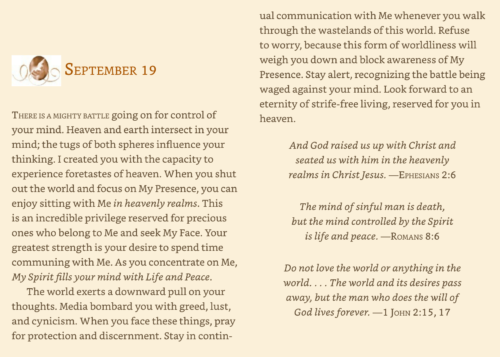A Ripening Mind and Heart
In this week’s meditations, Father Richard Rohr and other teachers consider how to age well with consciousness, spiritual depth, and purpose. In this essay from the CAC’s journal Oneing, Richard uses the image of ripening to describe this process:
The word “ripening” helps us move beyond any exclusive concern with physical aging, because our concerns are much more than that. If I am to believe the novels, myths, poems, and people I have met in my life, old age is almost never described as an apex of achievement as one sits atop a summit with the raised arms of a victorious athlete. It is something else, almost always something else—usually something other than what was initially imagined, or even hoped for.
Ripening, at its best, is a slow, patient learning, and sometimes even a happy letting go—a seeming emptying out to create readiness for a new kind of fullness—which we are never sure about. If we do not allow our own ripening, an ever-increasing resistance and denial sets in, an ever-increasing protection around an over-defended self. At our very best, we learn how to hope as we ripen. Youthful hopes have concrete goals, whereas the hope of older years is usually aimless hope, hope without goals, even naked hope — perhaps real hope.
Such stretching is the agony and the joy of later years, although one can avoid both of these rich experiences too. Old age, as such, is almost a complete changing of gears and engines from the first half of our lives, and does not happen without many slow realizations, inner calmings, lots of inner resistance and denials, and eventual surrenders. All of them by God’s grace work with our ever-deepening sense of what we really desire and who we really are.
Reality, fate, destiny, providence, and tragedy are slow but insistent teachers. The horizon of old age seems to be a plan that God has prepared as inevitable and part of the necessary school of life. What is gratuitously given is also gratuitously taken away, just as Job slowly came to accept. And sometimes we remember that his eventual pained response was “Blessed be the name of the Lord!” (Job 1:21).
If we are to speak of a spirituality of ripening, we need to recognize that it is always characterized by an increasing tolerance for ambiguity, a growing sense of subtlety, an ever-larger ability to include and allow, and a capacity to live with contradictions and even to love them! I cannot imagine any other way of coming to those broad horizons except through many trials, unsolvable paradoxes, and errors in trying to resolve them.
The ripening of mind and heart is most basically a capacity for nondual consciousness and contemplation. So my guidance is a simple reminder to recall what we will be forced to learn by necessity and under pressure anyway—the open-ended way of allowing and the deep meaning that some call faith. To live in trustful faith is to ripen; it is almost that simple.
The Second Journey
Father Richard describes the conscious attention and intention necessary to “fall upward” into a purposeful second half of life:
Most of us tend to think of the second half of life as largely about getting old, dealing with health issues, and letting go of our physical life, but I simply don’t believe that’s all there is to it. What looks like falling can largely be experienced as falling upward and onward, into a broader and deeper world, where the soul finds its fullness, is finally connected to the whole, and lives inside the Big Picture.
It is not a loss but somehow a gain, not losing but actually winning. We probably have to have met at least one true elder to imagine this could be true. I’ve met enough radiant people to know that it is possible. They have come to their human fullness, often against all odds, usually by suffering personally or vicariously and empathetically. As Jesus describes such a person, “from their breasts flow fountains of living water” (John 7:38). They are models and goals for our humanity, much more than the celebrities and politicians whose actions we seem to care so much about today.
Remember, no one can keep us from the second half of our own lives except ourselves. Nothing can inhibit our second journey except our own lack of courage, patience, and imagination. Our second journey is all ours to walk or to avoid. My conviction is that some falling apart of the first journey is necessary for this to happen, so don’t waste too many moments lamenting poor parenting, lost jobs, failed relationships, physical challenges, economic poverty, or other tragedies. Pain is part of the deal. If we don’t walk into the second half of our own life, it is surely because we do not want it. Let’s desire, desire deeply, desire ourselves, desire God, desire everything good, true, and beautiful. All of the emptying out is for the sake of a Great Outpouring.
Jesuit theologian and scientist Pierre Teilhard de Chardin (1881–1955) prayed to allow his life to unfold in full confidence of God’s presence until the very end:
When the signs of age begin to mark my body (and still more when they touch my mind); when the ill that is to diminish me or carry me off strikes from without or is born within me; when the painful moment comes in which I suddenly awaken to the fact that I am ill or growing old; and above all at that last moment when I feel I am losing hold of myself and am absolutely passive within the hands of the great unknown forces that have formed me; in all those dark moments, [1]
